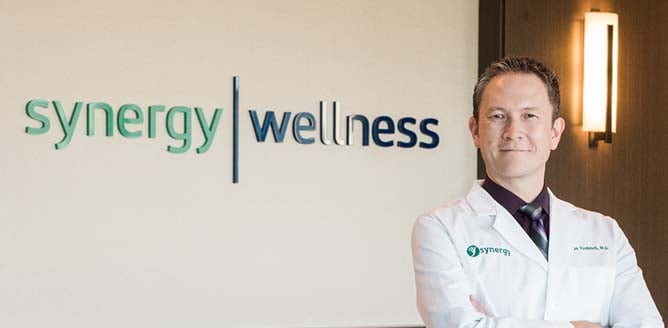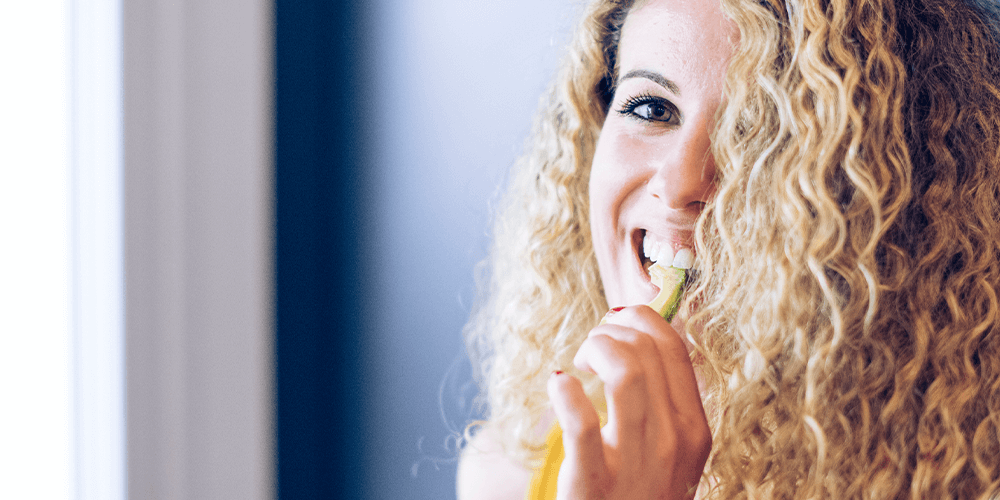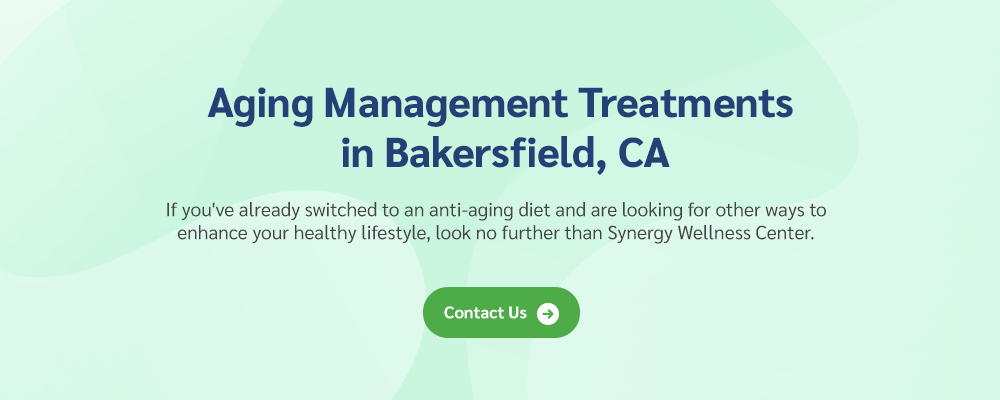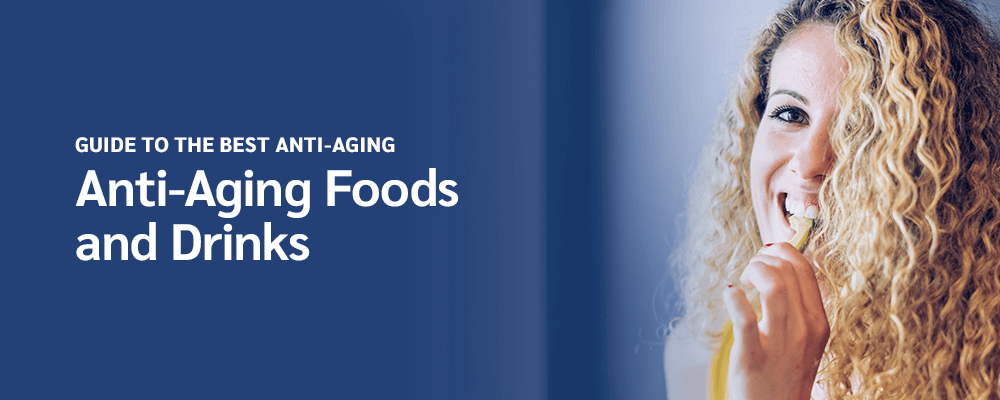
Aging is a natural part of life, but what if we told you that you could reduce and prevent its signs by changing your diet? Switching to whole, unprocessed anti-aging foods prevents wrinkles, dark spots, fine lines and other symptoms of aging skin.
Below, we’ll guide you through what to eat to look younger and feel healthier.
Antioxidants and Free Radicals in the Body
Superfoods are ultra-healthy, low-caloric foods containing abundant nutrients and antioxidants.
All fresh fruits and vegetables are natural anti-aging foods that support weight management and help prevent the onset of chronic diseases associated with aging.
Superfoods also counteract the damaging effects of free radicals, or unstable molecules that attack proteins, DNA and other cellular material. What causes free radicals? These result from our metabolism and exposure to toxic materials in the environment, such as cigarette smoke, air pollution or ultraviolet rays from the sun. Free radicals only live in the body for less than a second, but that short amount of time can still cause damage to cells and DNA.
Your body also develops free radicals as an immune response to fight intruders or during exercise. Researchers believe this is a normal bodily response to promote insulin absorption in the muscles.
Free radicals cause oxidative stress within the body, an action hypothesized to be responsible for various inflammatory conditions such as cancer, atherosclerosis, heart disease and Alzheimer’s disease.
While disease is the primary concern with free radicals, they also can be responsible for damaging cells and speeding up aging. Exposure to free radicals caused by smoking or UV light can increase the appearance of fine lines, wrinkles and dark spots.
Eating foods high in antioxidants can neutralize free radicals, reducing or eliminating the damage they cause to your cells and DNA.
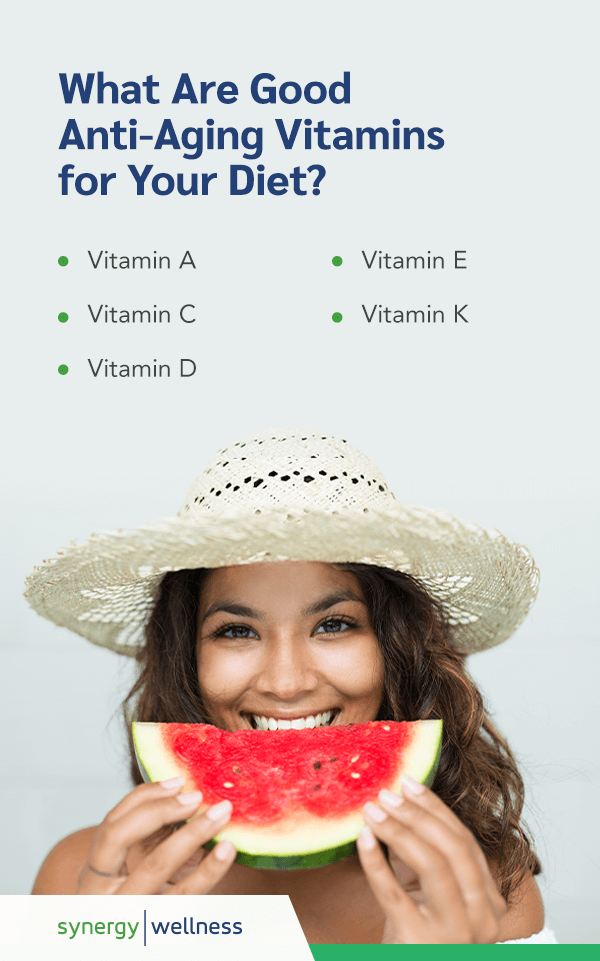
What Are Good Anti-Aging Vitamins for Your Diet?
Vitamins play a crucial role in our overall health, but they can also reduce the appearance of aging. Incorporating the right vitamins in your diet can keep your skin looking healthy and youthful while benefiting the different systems in your body. You’ll look younger and reap the benefits of a balanced and nutritional diet.
Below are some of the best anti-aging vitamins to incorporate into your diet.
Vitamin A
Vitamin A, found in many anti-wrinkle foods, works as an antioxidant for every layer of your skin. It can protect you from sun damage, which accelerates signs of aging such as fine lines, wrinkles and sunspots. Vitamin A also binds to receptors in the skin, strengthening your epidermis. Firm skin will maintain its youthful appearance longer and prevent damage from outside sources.
If you don’t get enough vitamin A in your diet, you might experience dry, itchy or bumpy skin, which can contribute to an aged appearance. The right amount of vitamin A will reduce fine lines and hyperpigmentation and create glowing, youthful skin.
Vitamin C
Vitamin C already exists in high levels in the skin. Like vitamin A, it’s an antioxidant that reduces oxidative stress in the body. Vitamin C also promotes collagen production, reducing skin sagging and keeping the skin looking plump and youthful.
Vitamin C also minimizes damage caused by UV light and increases the effectiveness of sunscreen. Having enough vitamin C limits melanin production, which is responsible for hyperpigmentation and brown spots.
The likelihood of a vitamin C deficiency is low since it’s abundant in so many foods. Still, if you aren’t getting enough of your daily intake, you can always eat citrus foods with plenty of vitamin C, such as oranges or grapefruit.
Vitamin D
Your body produces vitamin D naturally after exposure to sunlight. Too much vitamin D can cause a condition called actinic keratosis, which causes rough patches on the skin.
Vitamin D can even out your skin tone, treat conditions such as psoriasis and strengthen your bones. If you’re primarily getting your vitamin D from the sun, you increase the likelihood of sun damage, which can prematurely age your skin. It’s best to balance your vitamin D intake by finding ways to incorporate the vitamin into your diet to prevent aging from the sun.
Vitamin E
Vitamin E is another antioxidant that absorbs UV rays from the sun. Vitamin E plays a crucial role in skin health by preventing damage that causes cancer, wrinkles and fine lines. It works in tandem with vitamin C to strengthen the walls of your skin cells.
Vitamin E is an excellent all-around remedy for various skin disorders or conditions, such as burns, scars and wounds. It repairs uneven texture and supplies moisture to the skin. Dry skin can cause fine lines or wrinkles, so providing your body with enough vitamin E can reduce the signs of aging.
Vitamin K
Vitamin K is an essential nutrient for reducing the signs of aging. Vitamin K assists in the blood clotting process, a crucial stage in healing wounds or bruises. It’s also beneficial at minimizing stretch marks, scars and dark circles under the eyes.
Vitamin K is vital for protecting collagen in the body, which is responsible for providing skin’s elasticity and youthful appearance. Getting enough vitamin K through your diet can help your skin look plump and smooth.
17 of the Best Anti-Aging Foods for Younger-Looking Skin
Preventing free radical damage can have a multitude of health benefits. Here are 17 foods that fight aging to add to your diet to keep your heart and skin healthy and free radicals at bay.
1. Brussels Sprouts
Rich in vitamins, minerals, antioxidants and fiber, Brussels sprouts are an all-around superfood that may also reduce acne and blemishes by inhibiting sebaceous gland activity. To receive the benefits of Brussels sprouts, aim for eating them at least two to three times per week, with a serving size of about 1-1/2 cups.
2. Salmon
Like all fatty fish, including bluefish, trout and sardines, salmon provides plenty of protein and omega-3 fats to keep your heart beating happily and skin glowing. Omega-3 fatty acids are also beneficial in preventing some cancers.
3. Quinoa
A gluten-free type of cereal and edible seed, quinoa is similar to buckwheat and contains good amounts of calcium, fiber, protein and iron. In addition to being heart-friendly, quinoa also has lysine, an essential amino acid promoting skin and tissue growth.
4. Blueberries, Raspberries and Strawberries
Eating a handful of these naturally sweet, antioxidant-rich, anti-aging foods every day can prevent oxidative stress, improve urinary tract health, optimize brain functioning and keep your skin clear and shining. Including various berries in your diet can also reduce your risk of disease.
5. Garlic
Anti-aging benefits you’ll receive from garlic include reducing systemic inflammation, promoting cell health and boosting your immune system. A properly working immune system is the most effective resource to fight skin infections and diseases.
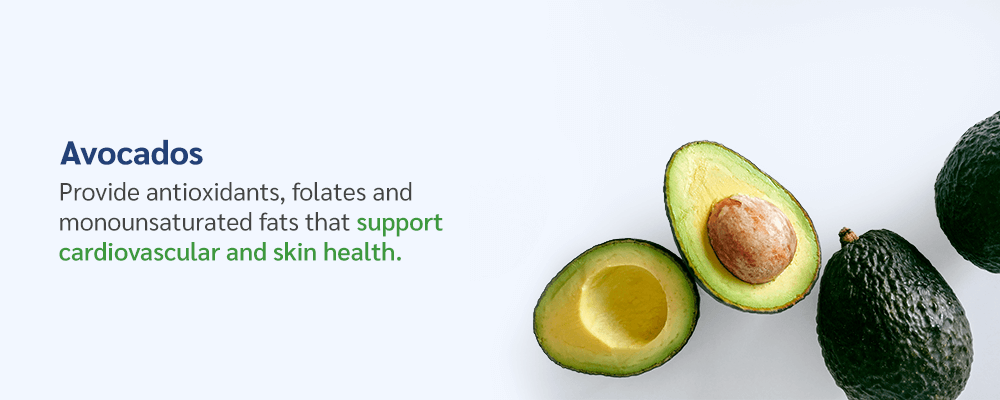
6. Avocados
Avocados are rich in potassium and vitamin E. They also provide antioxidants, folates and monounsaturated fats that support cardiovascular and skin health.
7. Carrots
Carrots are an excellent source of essential nutrients for healthy and glowing skin. Get all the beta-carotene and antioxidants you need from carrots. Whether eaten raw or cooked, carrots can help renew skin cells and eliminate free radical damage.
8. Pomegranates
Packed with polyphenols, super-nutrients and vitamin C, pomegranates can help your skin look “plumped” and smooth while fighting free radical damage responsible for age-related diseases.
9. Olive Oil
Olive oil contains anti-inflammatory monounsaturated fats and age-defying antioxidants. Olive oil may lower your risk for cardiovascular disease, cognitive decline and some cancers. It may also help premature wrinkling.
10. Ginger, Turmeric and Other Herbs and Spices
Instead of salt, use anti-inflammatory herbs and spices to flavor food, protect you against cardiovascular disease, regulate blood glucose and promote collagen production. For example, turmeric is a traditional cure in Asian countries and is even helpful in treating skin cancer and wound healing.
11. Beans and Legumes
Beans are high in protein and zinc, which fights off acne and breakouts. Amino acids are abundant in beans, which help your body heal and build new tissues after a wound.
Legumes are an excellent source of vitamin B3, an essential vitamin for healthy and radiant skin.
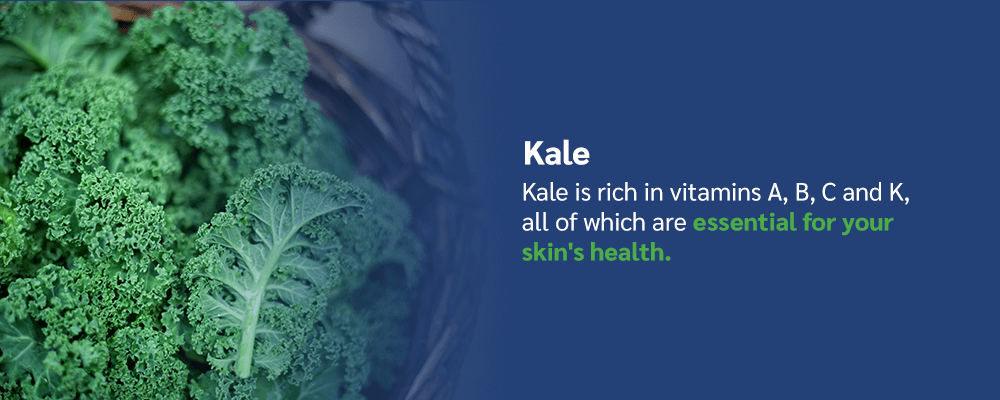
12. Kale
Kale is rich in vitamins A, B, C and K, all of which are essential for your skin’s health. These vitamins boost collagen production, prevent sun damage and keep your skin flexible and healthy. Incorporating kale into your diet can reduce the appearance of fine lines and wrinkles.
13. Watermelons
Watermelons provide vital hydration. Watermelon is also a powerhouse source of vitamin C, D, E and antioxidants, rejuvenating the skin and promoting healing. These vitamins will protect your skin from UV rays, maintaining your youthful glow.
14. Walnuts
Walnuts are another high-antioxidant food, but they’re also rich in vitamin B, which shields against sun exposure and other environmental toxins, such as pollution and dirt. This protection reduces skin damage that can cause breakouts, fine lines and wrinkles.
15. Red Grapes
Like watermelon, red grapes have plenty of water, an essential part of maintaining healthy skin. Red grapes also come loaded with antioxidants and vitamin C, which revitalize the skin and protect it from UV damage that can cause free radicals. Adding red grapes to your diet can prevent wrinkles and dark spots.
16. Green Tea
Many people use green tea for its anti-inflammatory properties. It can reduce inflammation, redness and swelling. Some people even use it to treat minor cuts or sunburns. Green tea has caffeine, but not as much as coffee or most sodas, making it a healthier alternative.
17. Dark Chocolate
The ingredients in dark chocolate contain a rich amount of antioxidants and anti-inflammatory properties. Eating dark chocolate in moderation can even skin pigmentation, promote collagen production and boost blood circulation. Dark chocolate can even replace lost moisture.
What Foods Can Speed up Aging?
While some foods can slow the signs of aging, others can accelerate it. One or two of these foods won’t cause much harm in moderation. However, eating too many of the following things can increase your chances of skin damage.
Processed Meat
Processed meats, such as hot dogs, bacon and pepperoni, are high in sodium, sulfites and saturated fats. The presence of these elements and fatty acids dehydrates the skin. They can also weaken collagen production by causing inflammation.
If you’re looking for a healthier protein alternative, consider switching to lean meat, like turkey or chicken. You can also get your daily protein intake from plant-based sources such as beans and quinoa.
Alcohol
There are numerous adverse side effects to drinking alcohol, but it’s also among the worst culprits of premature aging. It inhibits collagen and vitamin A production while weakening your immune system, making your skin appear puffy, red and inflamed. You’re also more likely to experience skin wrinkles from frequent alcohol consumption.
If you drink, only do so in moderation and stay hydrated. Women should limit themselves to one drink a day and men to two drinks a day.
Greasy Foods
Greasy foods are a drive-through staple and are convenient options for people eating on the go. However, foods fried in oil at high temperatures, such as French fries, can introduce additional free radicals into the body. The damage these free radicals can do includes causing fine lines and wrinkles, making you appear older than you are.
Sugar
Eating too much sugar can cause acne breakouts, which can damage the skin if left untreated. Acne can cause scars, uneven skin texture, redness and swelling. Ice cream, candy and other sugary foods can accelerate aging.
Dairy
Dairy is an essential part of many people’s diets. However, some people can experience inflammation from eating dairy, which causes oxidative stress in the body.
You can always cut some dairy from your daily intake to see if it improves your skin. If it doesn’t, look for other foods in your diet that hasten the aging process.
Soda and Coffee
Sometimes, we need a little kick in the morning or throughout the day and drink a coffee or soda to give us that much-needed caffeine boost. However, consuming either of these drinks in excess adversely affects your overall health.
Soda and coffee can dehydrate you, which can lead to inflammation or redness. Coffee can also inhibit hormone production that allows for oil production. The natural oils the skin produces act as a moisture barrier, hydrating your skin and protecting you from the elements. When you don’t have enough of these oils, your skin will dry out, leaving you prone to acne, fine lines and wrinkles, which can increase the signs of aging.
Aging Management Treatments in Bakersfield, CA
If you’ve already switched to an anti-aging diet and are looking for other ways to enhance your healthy lifestyle, look no further than Synergy Wellness Center. We use multiple methods to improve your skin’s appearance, such as medical weight loss management and bioidentical hormone replacement therapy. We can help you develop a dietary plan to reduce your calorie intake and start an exercise routine. We can also optimize your body’s hormone levels to prevent age-related symptoms that appear as you get older.
Get even more information about anti-aging foods and lifestyle changes that can keep you in peak physical, mental and emotional health by contacting Synergy Wellness Center today.

